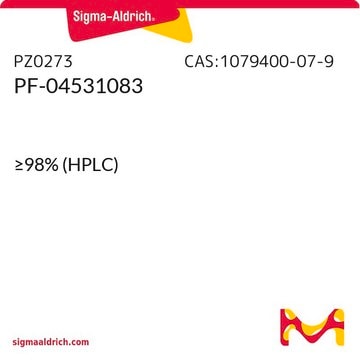SCC243
YUMMER1.7D4 Mouse Melanoma Cell Line
The YUMMER1.7D4 mouse melanoma cell line is a valuable model for studies of immune checkpoint inhibition and mechanisms of anti-tumor responses.
Synonym(s):
Mouse Melanoma Cells, YUMMER1.7D4 Cells
Sign Into View Organizational & Contract Pricing
All Photos(1)
About This Item
UNSPSC Code:
41106514
NACRES:
NA.81
Recommended Products
application(s)
cell analysis
General description
The YUMMER1.7D4 mouse melanoma cell line is both immunocompetent and reflective of the somatic mutations common in melanomas. YUMMER1.7D4 carries three driver mutations of melanoma: Braf V600E, Pten -/- and Cdkn2 -/- (1,2). In addition, the YUMMER1.7D4 cell line harbors a high frequency of stable UV-induced somatic mutations which have been shown to stimulate host adaptive immune response (3). YUMMER1.7D4 cells are diploid, allowing for enhanced knockout frequency in CRISPR-based screens. The unique features of the YUMMER1.7D4 cell line make it a valuable model for studies of immune checkpoint inhibition and mechanisms of anti-tumor responses.
<bold>Source:</bold>
The YUMMER1.7D4 mouse melanoma cell line is a diploid clonal isolate from YUMM1.7D4 cells exposed to UVB radiation. The original YUMM1.7 cell line was derived from a 4-hydroxytamoxifen-induced melanoma tumor in a male C57/B1/6 mouse into which mutations from the Braf/Pten genetically-engineered mouse model had been introduced via backcrossing (1). The YUMMER1.7D4 cell line harbors the Braf V600E mutation and is homozygous negative for wild-type Pten and Cdkn2 (3).
Research Category:
Cancer
<bold>Source:</bold>
The YUMMER1.7D4 mouse melanoma cell line is a diploid clonal isolate from YUMM1.7D4 cells exposed to UVB radiation. The original YUMM1.7 cell line was derived from a 4-hydroxytamoxifen-induced melanoma tumor in a male C57/B1/6 mouse into which mutations from the Braf/Pten genetically-engineered mouse model had been introduced via backcrossing (1). The YUMMER1.7D4 cell line harbors the Braf V600E mutation and is homozygous negative for wild-type Pten and Cdkn2 (3).
Research Category:
Cancer
Cell Line Origin
Mouse, Cancer Cells
Packaging
≥1X106 cells/vial
Storage and Stability
Store in liquid nitrogen. The cells can be cultured for at least 10 passages after initial thawing without significantly affecting the cell marker expression and functionality.
Other Notes
This product is intended for sale and sold solely to academic institutions for internal academic research use per the terms of the “Academic Use Agreement” as detailed in the product documentation. For information regarding any other use, please contact licensing@emdmillipore.com.
Disclaimer
This product contains genetically modified organisms (GMO).
Within the EU GMOs are regulated by Directives 2001/18/EC and 2009/41/EC of the European Parliament and of the Council and their national implementation in the member States respectively. Unless otherwise stated in our catalog or other company documentation accompanying the product(s), our products are intended for research use only and are not to be used for any other purpose, which includes but is not limited to, unauthorized commercial uses, in vitro diagnostic uses, ex vivo or in vivo therapeutic uses or any type of consumption or application to humans or animals.
Within the EU GMOs are regulated by Directives 2001/18/EC and 2009/41/EC of the European Parliament and of the Council and their national implementation in the member States respectively. Unless otherwise stated in our catalog or other company documentation accompanying the product(s), our products are intended for research use only and are not to be used for any other purpose, which includes but is not limited to, unauthorized commercial uses, in vitro diagnostic uses, ex vivo or in vivo therapeutic uses or any type of consumption or application to humans or animals.
Storage Class Code
10 - Combustible liquids
WGK
WGK 1
Flash Point(F)
Not applicable
Flash Point(C)
Not applicable
Certificates of Analysis (COA)
Search for Certificates of Analysis (COA) by entering the products Lot/Batch Number. Lot and Batch Numbers can be found on a product’s label following the words ‘Lot’ or ‘Batch’.
Already Own This Product?
Find documentation for the products that you have recently purchased in the Document Library.
Our team of scientists has experience in all areas of research including Life Science, Material Science, Chemical Synthesis, Chromatography, Analytical and many others.
Contact Technical Service






